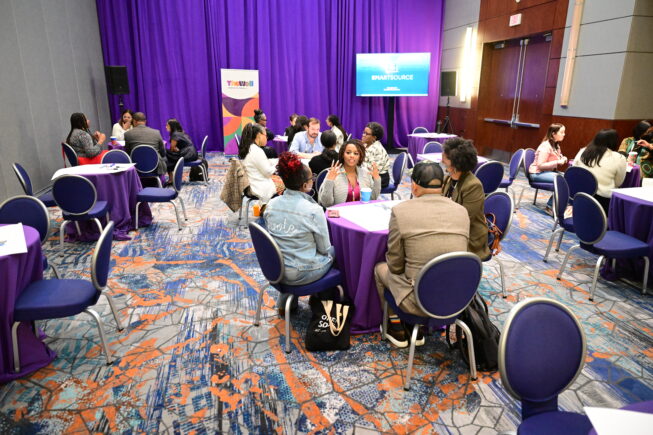The Well 2024: Big Ideas (Breakout session recap)

This year at The Well, we hosted a series of engaging breakout sessions to share empowerment and inspire action. Each session was designed and facilitated by our community, for our community, spreading innovative ideas and insights to create a roadmap of the collaborative work we need to do to create change.
The sessions were opportunities for The M.I.C ™ to explore a range of themes relevant to our collective mission and vision for an American Evolution.
Here’s a summary of the key highlights, themes, and takeaways from a few of the breakout sessions:
Making Tech a Tool for Democracy: An Interactive Design Session

If we are to unlock our individual and collective ability to prosper, our democracy must evolve. Advancements in technology, including artificial intelligence, data analytics, and social media platforms, hold great potential as tools for creating a more inclusive, more connected, and ultimately more resilient civic society. In this interactive session, participants gave life to new ideas for utilizing technology to shift narratives and mindsets, engage more deeply with people including youth, and build connections and community across lines of difference—all in service of creating a stronger, more resilient democracy.
Unlikely Co-Conspirators: Using Actor Mapping to Forge New Collaborations
The systems of opportunity in America—namely our education, economic and democratic systems—are incredibly complex and intertwined. In order to create meaningful and durable improvements that expand access and opportunity, we must develop strategies that center authentic and intentional collaboration with all of the actors within those systems. In this workshop, participants mapped the various actors within a system and explore the policies, practices, and narratives that, when coordinated together and through meaningful collaboration, lead to empowerment and action.

Unlocked Futures: Painting the Possible with Shaka Senghor

This session explored how proximity—being close to the problem—can drive innovative solutions in criminal justice reform. Alumni of Unlocked Futures shared their journeys of using lived experiences to challenge systemic inequities and rewrite false narratives.
Key themes:
- The value of diverse perspectives within shared environments, acknowledging that not all reentry stories are the same.
- Authenticity as a bridge to connect with others who share lived experiences, fostering community and empowerment.
- The interconnected nature of systems of oppression, such as the school-to-prison pipeline and immigration detention.
“The amount of genius entrapped behind these walls is something we need to know a whole lot more about.”– Shaka Senghor
Flipping the Script: Driving Change Through New Narratives

Facilitators Jesús Genera and Melinda Weekes-Laidlow led a powerful exploration of how narratives shape societal structures and behaviors. Participants reflected on the importance of reclaiming stories to shift from deficit-based narratives to ones that inspire change.
Key Takeaways:
- Narratives are patterns of stories that inform our worldview, and narrative change is a form of social change.
- Dominant narratives can harm targeted groups and indirectly affect everyone.
- Digital storytelling can amplify positive narratives and foster collective action.
“Poverty is not a choice; it is a policy.”– Jesús Genera
Where We’re From: Bridging Rural and Urban Communities

This session delved into the rural-urban divide, revealing commonalities often overlooked in polarized discussions. Through shared stories and data, participants discovered a surprising alignment in values and challenges.
Key Insights:
- Rural communities represent 20% of the U.S. population but receive only 7% of philanthropic funding.
- Mistrust of government is prevalent across rural and urban areas, with many feeling left behind.
- Shared interests—such as jobs, wages, and cost of living—highlight the potential for collaboration.
“If rural and urban communities can’t organize together effectively, there cannot be a multiracial democracy.”
Across Generations: Building a Better Democracy Together
There are currently seven different generations living in America, five of which are active in the workforce. Yet most of the structures of our physical and digital communities are not designed to foster intergenerational relationships. In this session, participants engaged in discussions about effective strategies in rural, urban, and online communities to equip and empower various generations to participate in decisions that impact our shared future. With a focus on case studies from different communities, participants will have a hands-on opportunity to engage with these challenges and the emerging strategies to repair the fabric of our intergenerational communities.

Key Takeaways:
- Community engagement strategies must account for inclusivity and power dynamics.
- Narratives play a crucial role in digital and in-person community building.
- Trust, while fragile, is foundational to collective progress.
“There is no ‘one size fits all’ approach that will address every community’s needs and brilliance.”
Moving Forward: Lessons from the Breakouts
The breakout sessions collectively emphasized the transformative power of proximity, narrative reclamation, and collaborative engagement across divides. They served as a reminder that systemic change requires amplifying the voices of those most affected, bridging gaps between diverse communities, and intentionally shaping new narratives that inspire action and hope.
As we continue this work, let’s remember: the solutions we seek often already exist within the communities we serve. By showing up authentically, fostering trust, and telling better stories, we can drive the collective impact needed to build a more equitable future.